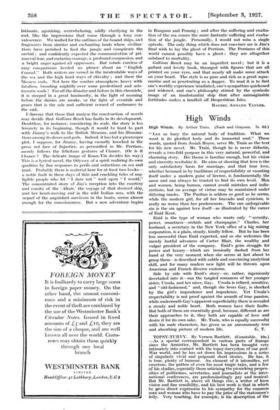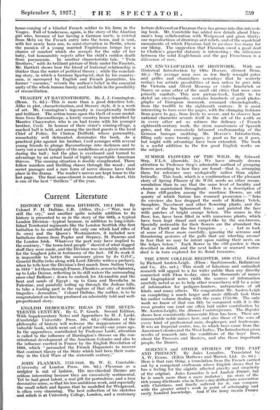TOPSY-TURVY. By Vernon Bartlett. (Constable. 10s.) —As a special correspondent
in various parts of Europe since the Armistice, Mr. Bartlett has been brought very intimately into contact with the topsy-turvydom of our post- War world, and he has set down his impressions in a series of singularly vivid and poignant short stories. He has, it is true, plenty of humour. An element of it intensifies, yet sweetens, the pathos of even his most tragic tales, and a few Of his studies, especially those satirising the picnicking propen- sities of politicians, secretaries, and journalists at the inter- national conferences, are predominatingly gay and ironical. But Mr. Bartlett is, above all things else, a writer of keen vision and fine sensibility, and his best work is that in which he, gives direct expression to his sympathy for the common man and woman who have to pay the price of the statesmen's folly. Very touching, for example, is his description of the
home-coming of a blinded French soldier to his farm in the Vosges. Full of tenderness, again, is the story of the Alsatian girl who, because of her having a German uncle, is evicted from Metz on the French entry into the town. and is cent, with her newly born son, to semi-starvation in Berlin, where the passion of a young married Englishman brings her a chance of comfort which she accepts for the sake of her baby, but honourably rejects after the child's sudden death from pneumonia. In another characteristic tale, " Twin Brothers," with its brilliant picture of Italy under the Fascists, Mr. Bartlett shows how the blood of fraternal relationship is thicker than the water of political theory ; while the conclud- ing story, in which a German Spartacist, shot by his country- men, is succoured by English and French journalists, his former "enemies," reveals the author's belief in the essential unity of the whole human family and his faith in the possibility of reconciliation.











































 Previous page
Previous page